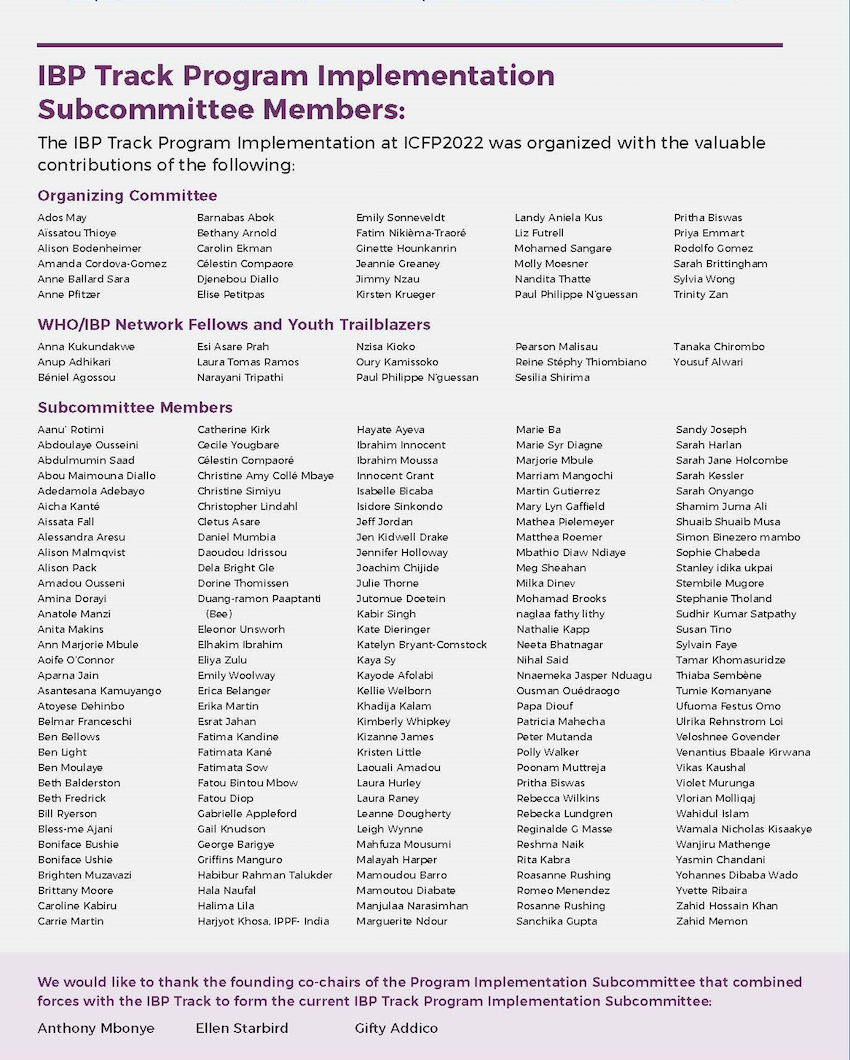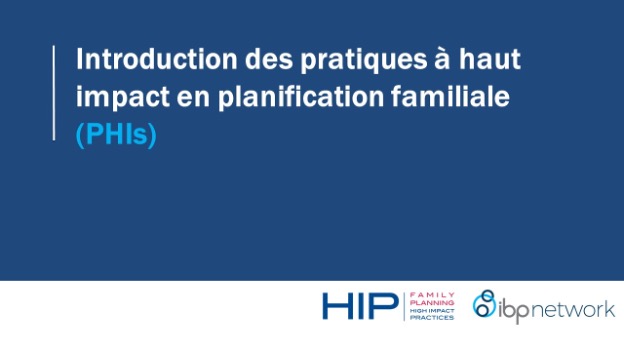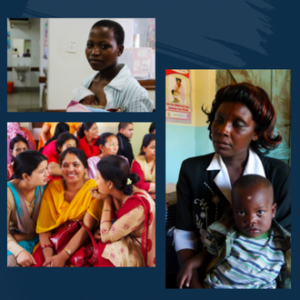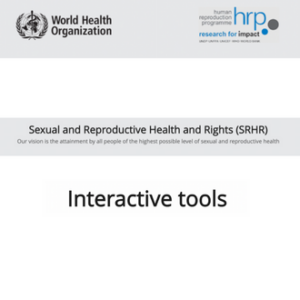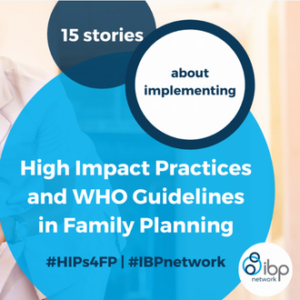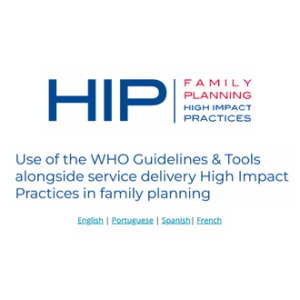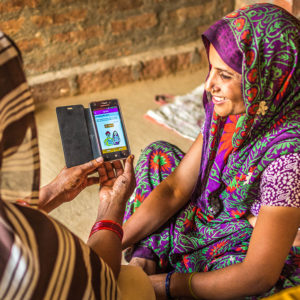IBP Track Program Implementation Subcommittee
Community Page
About the Program Implementation Subcommittee
The ICFP IBP Track Program Implementation subcommittee aims to complement other subcommittees and scientific tracks, and highlight experiential learning of diverse groups of stakeholders. Through a highly interactive track, created by a diverse group of implementers, the subcommittee will highlight the critical linkages between these groups of experts and advocates in strengthening family planning programs and improving equity and access to family planning information and services.
Committee's Vision for ICFP2022
Our vision is that family planning programs are grounded on sound research, evidence, and the expertise of stakeholders, including young people, grassroots organizations, and implementers in the countries and communities where they work.
Members, Partners & Supporters
Current membership includes WHO/IBP Network executive leadership, IBP Network members, ICFP2022 Youth Trailblazers, WHO/IBP Global Fellows, stakeholders from civil society organizations, government, and researchers, who bring a wealth of experience to multiple aspects of family planning program implementation. Sub-committee co-chairs:
Ados May, WHO/IBP Network, amay@phi.org and Aissatou Thioye, FHI 360/Knowledge SUCCESS, athioye@fhi360.org
Get In Touch
Contact:
Program Implementation & #NotWithoutFP Forum
Introduction des pratiques à haut impact en planification familiale
IBP Track Program Implementation Overview
The IBP Track Program Implementation is a unique interactive platform for participants to collaborate and learn about innovative approaches, various new tools and resources to support stronger family planning and reproductive health (FP/RH) programs.
Objectives:
- Engage partners, governments, practitioners, scientists, youth-led organizations and activists from across the regions and sectors
- Create an equitable collaborative space where different experiences, languages and geographies are represented
- Create space and opportunities to exchange experiences on ‘what works’ and ‘what doesn’t work’ and how they can apply to different contexts
- Encourage long-standing and new partners to push the boundaries and work with countries to achieve their vision of sustainable development – and UHC in particular – by investing in family planning, and supporting resilient health systems and services
ICFP2022 IBP Track Program Implementation Synthesis Report
Ahead of ICFP2022, the IBP Program Implementation Subcommittee organized a full-day pre-conference as well as eight technical sessions in various languages.
This subcommittee aimed to highlight the critical linkages between different groups of experts and advocates, who all share a dedication to strengthening family planning (FP) programs and to improving equitable access to FP information and services.
You can now see all the highlights from these various activities in the brand new ICFP2022 IBP Track Program Implementation Synthesis Report. Explore the recap to see takeaways from the pre-conference, sessions, key resources, and more–in both English and French!
Planned Activities
See all that is happening with Program Implementation at ICFP2022 at a glance and download the below PDF guide:
Webinar
On 17 October 2022, the IBP Track Program Implementation Subcommittee held two webinars to orient stakeholders on the various activities it is coordinating and to provide an opportunity for the global community to hear about ICFP in general.
Watch the webinars here:
Pre-conference, November 13, 2022
Visit the IBP Track Program Implementation Pre-conference page HERE.
This one-day meeting will bring together family planning experts working in program implementation. Participants will come together to learn about innovative approaches, discuss the importance of monitoring implementation and share promising strategies to address current and future challenges in family planning program implementation. The pre-conference is organized in two parts:
1.) Morning Session – 08:30 am – 12:00 Noon
Engage – Create – Innovate – Document
WHO/IBP Network and UNFPA are organizing this event to hear from partners about innovative approaches to implementation such as south to south learning, digital technologies, and engaging marginalized populations. Through a series of interactive approaches participants will learn about creative techniques like storytelling and multimedia to document evidence on FP/SRH programs and identify opportunities to engage with policy makers and parliamentarians to make commitments and investments in FP/SRH.
LUNCH – 12:00 pm – 1:00 pm
2.) Afternoon Session – 1:00 pm – 5:00 pm
How Do You Know When You’re Doing It Right? Monitoring Implementation of Family Planning Practices
This interactive session, organized by FHI 360, will be an opportunity to bring together diverse stakeholders to understand why monitoring implementation of FP practices is important, define what monitoring implementation of FP practices means and explore how to monitor implementation of FP practices by identifying current gaps and challenges and sharing promising strategies with each other. This conversation aims to move the community toward harmonized measurement standards for implementation of FP practices to further support scale-up and impact.
—
Advance registration is requested: REGISTER HERE
Further details and an agenda are forthcoming. If you have questions, please contact athioye@fhi360.org or amay@phi.org
This in-person event is for ICFP registrants. The event will be in English with no interpretation. Times are listed in Pattaya City time (GMT +7).
Reception: A celebration to showcase implementation achievements
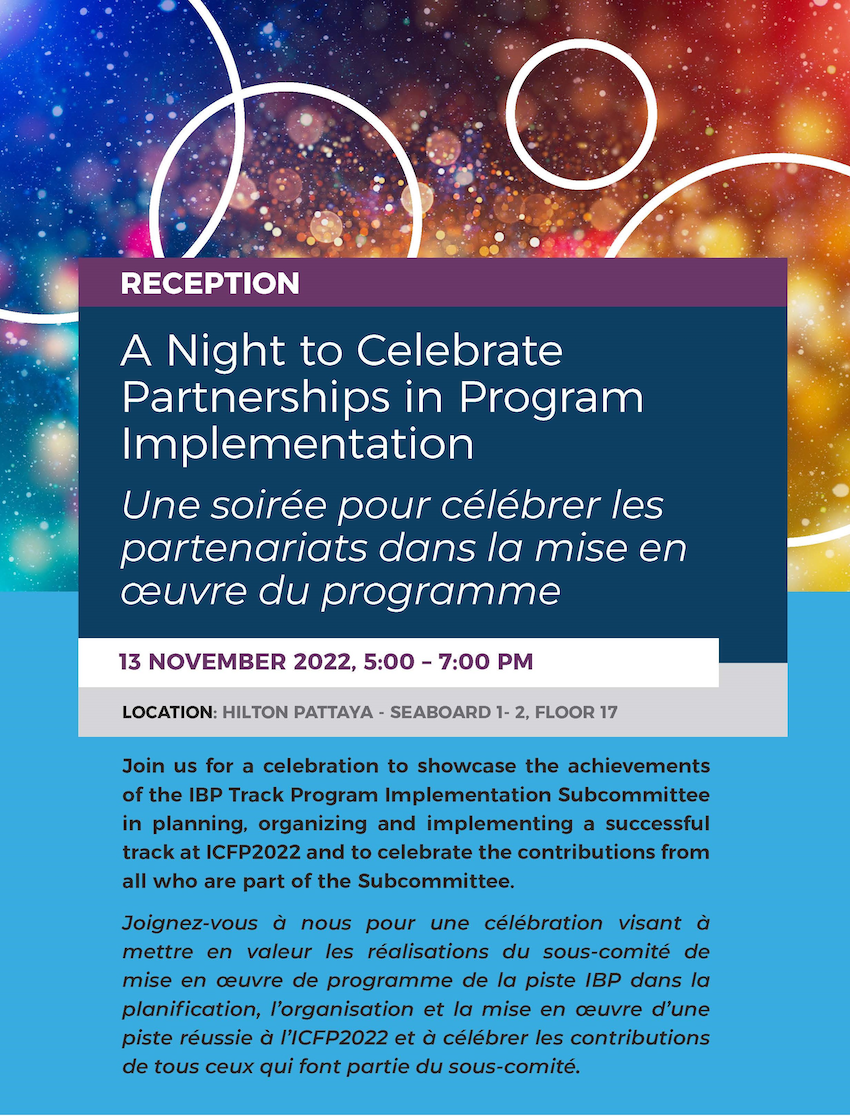
Join us for a celebration to showcase the achievements of the subcommittee in planning, organizing and implementing a successful track at ICFP2022 and to celebrate the contributions from all who are part of the IBP Track Program Implementation Subcommittee.
Date and time: Sunday, 13 November 2022 from 5:00 to 7:00 PM
Location: HILTON PATTAYA – SEABOARD 1-2, 17 FLOOR
8 Interactive Sessions, November 15-16, 2022
Location: Pattaya 16 – PEACH Convention Center, Level 6
10:15 – 11:35 AM November 15, 2022
Outils pratiques pour l’engagement communautaire et la prestation de services à base communautaire ; Practical tools for community engagement
Cette session francophone sur les approches axées sur la communauté, de l’engagement communautaire à la prestation de services communautaires, utilisera un format de café des connaissances pour orienter les participants vers une gamme d’outils pratiques développés, mis en œuvre et évalués par les différentes organisations facilitatrices des tables que vous aurez à visiter. Apprenez les expériences de mise en œuvre des facilitateurs et engagez un dialogue avec des collègues de divers milieux.
Organizers :
| Name | Organization | |
| Ginette Hounkanrin | Pathfinder International | ghounkanrin@pathfinder.org |
| Elise Petitpas | Equipop | elise.petitpas@equipop.org |
| Paul-Phillipe N’guessan | Youth Trailblazer | paulphilippesaj@gmail.com |
11:50 – 1:10 PM November 15, 2022
Take It to Scale: Engaging with the Experts
Through a moderated panel discussion on the scale-up of high-impact practices in family planning (FP) and a knowledge café featuring diverse programmatic examples from Passages, E2A, WISH, SupCap, Beyond Bias, and other projects, session participants will accomplish the following objectives:
- Explore common scale-up challenges, pitfalls, and failures, and share tested solutions
- Discuss scale-up strategies and tools for reaching specific populations (e.g., adolescents, persons with disabilities, people living in poverty)
- Synthesize practical tips, key lessons, and recommendations for successful scale-up of FP interventions
- Network with other implementers, researchers, and decision makers working to scale FP interventions around the world
Organizers:
| Name | Organization | |
| Barnabas Abok | IPPF WISH project | babok@ippf.org |
| Liz Futrell | Pathfinder International | lfutrell@pathfinder.org |
2:40 – 4:00 PM November 15, 2022
Using the FP Goals: Identifying Opportunities and the Estimated Impact of Different Scale-Up Scenarios
The Family Planning Goals Model (FP Goals) was developed by the Track20 Project to support governments in the development of evidence based strategic plans. FP Goals estimates the impact of high impact practices on modern contraceptive prevalence. The interventions included in the model are based on an extensive literature review and align with the High Impact Practices (HIPs). One of the unique aspects of FP Goals is that the model is calibrated to each country context. The current FP program is included in the baseline of the model so that opportunities can be identified and leveraged. The model has been used in many countries to support the development of new strategies, identify opportunities, set goals, and develop benchmarks and monitoring plans. During the session participants will be introduced to FP Goals including its assumptions, data needs, application process, and results. Specifically, by the end of the session, participants will be able to:
- Describe the purpose of FP Goals and when it can be useful to apply.
- Understand the assumptions used to estimate impacts, including how country context impacts the estimates.
- Learn about the unit cost database that can be combined with FP Goals to provide additional information for informed decision-making.
Organizers:
| Name | Organization | |
| Priya Emmart | Avenir Health | pemmart@avenirhealth.org |
| Emily Sonneveldt | Avenir Health | esonneveldt@avenirhealth.org |
4:15 – 5:35 PM November 15, 2022
Recursos y herramientas de PF/SR para y desde América Latina y el Caribe; FP/RH resources and tools for and from Latin America and the Caribbean
Únase a la Red IBP, CLAP / OPS y CCP en un café de conocimientos interactivo para conocer nuevas herramientas y recursos de capacitación creados por y para los profesionales de la PF/SR que trabajan en América Latina y el Caribe. Durante la sesión aprenderá más sobre las herramientas y recursos de PF/SR de organizaciones como La red IBP, CLAP /OPS, ForoLAC, Fos Feminista, TabuTabu, USAID y CAAN. Las herramientas incluirán cursos de aprendizaje virtual de PF/SR, prácticas de alto impacto, hojas informativas de seguridad anticonceptiva, formación para parteras, un sitio web para descubrir y organizar recursos, y una herramienta para responder a las necesidades de las mujeres y niñas indígenas. Venga a conocer las nuevas herramientas que puede utilizar para fortalecer y apoyar su trabajo de PF/SR. Esta sesión interactiva será en español sin interpretación.
Organizers:
| Name | Organization | |
| Rodolfo Gomez Ponce de Leon | OPS/CLAP/OMS | gomezr@paho.org |
| Anne Ballard Sara | JHU-Knowledge SUCCESS | anne.ballard@jhu.edu |
10:15 – 11:35 AM November 16, 2022
Outils et innovations de création de la demande pour booster l’utilisation des méthodes contraceptives dans les pays francophones ; Demand creation tools and innovations to boost contraceptive use in francophone countries
La création de la demande est un pilier de l’utilisation des méthodes contraceptives permettant de favoriser l’acceptation individuelle et collective de la PF, l’évolution positive des normes sociales en sa faveur et l’engagement des décideurs pour des actions fortes favorisant son acceptation. Rejoignez-nous dans cette session avec diverses parties prenantes de la PF pour des échanges interactifs sur la création de la demande. La session qui un riche cadre d’échanges et de partage comprendra deux parties : deux panels qui aborderont successivement la création de la demande en situation de crise sécuritaire et humanitaire dans le sahel, puis les rôles et responsabilités des jeunes dans l’élaboration et la mise en œuvre des politiques et programmes de planification familiale. Dans la 2e partie, des échanges interactifs du style de café des connaissances se feront autour de 3 tables pour échanger sur des bonnes pratiques et expériences relatives à la création de la demande.
Organizers:
| Name | Organization | |
| Mohamed Sangare | JHU-CCP/ Breakthrough ACTION | msangar2@jhu.edu |
| Djenebou Diallo | UCPO | ddiallo@partenariatouaga.org |
11:50 – 1:10 PM November 16, 2022
Translating HIPs (and More!) into Inclusive Service Delivery at Scale
This multi-lingual session will cover inclusive implementation of Service Delivery HIPs and training resources to support the same. Cette session multilingue traitera de la mise en œuvre inclusive des HIP de prestation de services et des ressources de formation pour les soutenir. Esta sesión multilingüe abarcará la aplicación inclusiva de las PAI de prestación de servicios y los recursos de formación para apoyarlos. The objective is to provide a space for sharing implementation experiences from programs, highlight successes, challenges, lessons learned and some best practices in implementing service delivery HIPs, particularly the HIPs on immediate postpartum family planning (IPPFP) and postabortion family planning (PAFP). The session will also provide a platform to showcase the new Family Planning Training Resource Package (TRP) and Spanish-language virtual training resources from PAHO. The session will be multilingual in French, Spanish and English, conducted in a knowledge cafe style that allows participants to rotate between 3 tables and exchange on country experiences implementing service delivery HIPs, and adaptations needed to make service delivery HIPs more inclusive and/or more applicable in fragile settings, and those affected by climate change, conflict and outbreaks. We will welcome feedback on the Service Delivery HIPs from implementation experience.
Organizers:
| Name | Organization | |
| Bethany Arnold | USAID | barnold@usaid.gov |
| Pritha Biswas | Pathfinder | pbiswas@pathfinder.org |
| Anne Pfitzer | Jhpiego | Anne.Pfitzer@jhpiego.org |
2:40 – 4:00 PM November 16, 2022
Outils et Ressources en français pour les professionnels de la PF/SR : la gestion des connaissances pour la PF en pratique ; Tools and resources for FP/RH professionals in French: Knowledge management for FP in practice
L’atteinte des objectifs de PF/SR au niveau global nécessite un partage de bonnes pratiques pour tirer parti de ce qui se fait de meilleur ailleurs. Dans cette session qui se déroulera sous forme de knowledge café et exclusivement en français, des organisations locales, internationales et de jeunes présenteront et échangeront avec vous sur des outils et ressources utiles pour les professionnels de la PF/SR. Ils partageront également les perspectives qu’ils offrent pour l’avancement de la PF/SR. Avec l’USAID, Jhpiego, TCI, l’Alliance des jeunes pour la santé reproductive de la RDC, Knowledge SUCCESS, PRB, INSPiRE, les jeunes ambassadeurs de la PF/SR du Sénégal, les jeunes ambassadeurs de la PF/SR de la Guinée venez à la découverte de ces ressources inspirantes.
Organizers:
| Name | Organization | |
| Alison Bodenheimer | Knowledge SUCCESS | abodenheimer@fhi360.org |
| Amanda Cordova-Gomez | USAID | acordovagomez@usaid.gov |
4:15 – 5:35 PM November 16, 2022
“Seul on va plus vite, ensemble on va plus loin”: comment les mobilisations multi-acteur.ices font avancer les DSSR dans les pays francophones ; ‘’Moving paths together toward an enabling SHRH ecosystem in Francophone Africa’’
La création d’un environnement favorable aux DSSR/ PF nécessite l’implication de différents types d’acteur.ice.s (la société civile, les représentants étatiques, des activistes jeunes, des praticien.ne.s, etc.) et passe par différentes formes de mobilisation. L’objectif de cette session sera de faire un tour d’horizon des expériences et pratiques dans les pays francophones et de permettre aux participant.e.s de nourrir leurs propres actions et/ou d’envisager des mobilisations communes. Cette session d’échanges interactifs au format de café des connaissances se tiendra exclusivement en français. Rejoignez-nous !
Organizers:
| Name | Organization | |
| Elise Petitpas | Equipop | elise.petitpas@equipop.org |
| Fatim Nikièma-Traoré | OPCU, CLA | ftraore@partenariatouaga.org |
| Landy Aniela Kus | Humanity & Inclusion | la.kus@hi.org |
| Célestin Compaore | Jhpiego | celestin.compaore@jhpiego.org |
8 Lunchtime Roundtable Discussions, November 15-16, 2022
Location: Royal Summit Chamber A (located in the Royal Cliff Beach Hotel)
The IBP Track Program Implementation Subcommittee will host eight lunch roundtable discussions that will take place during lunchtime. Participants will be able to join a table of their choice to learn about experiences and new tools for Family Planning programs. This is a unique opportunity to interact with colleagues in a small group setting to share experience and knowledge. Six sessions will be in English and two will be in French.
Tuesday, November 15
Table #15:
La production de résultats de recherche de qualité sur la planification familiale (PF) et leur utilisation pour informer les politiques et programmes dans la région de l’Afrique de l’ouest Francophone
Organizers: Population Council Senegal et Partenariat de Ouagadougou
Contact: Fatou Bintou Mbow, fmbow@popcouncil.org; Abdoulaye Ousseini, aousseini@partenariatouaga.org
Bien que des décideurs politiques engagés et des chercheurs experts existent dans la région de l’Afrique de l’Ouest Francophone et partagent une passion pour l’amélioration des résultats de la PF, il y a un manque de culture de collaboration qui leur permettrait d’augmenter leur impact collectif.
L’Objectif de la table ronde sera une opportunité de partage d’expériences et de débattre sur :
- Comment renforcer la collaboration avec les partenaires nationaux et régionaux
- Comment promouvoir l’utilisation des résultats de recherche pour informer les politiques et programmes
Wednesday, November 16
Table # 7:
FP and Comprehensive Abortion Care Toolkit for primary health care providers
Organizer: WHO
Contact: Ulrika Rehnstrom Loi, rehnstromu@who.int
WHO has produced a toolkit for primary health care workforce with the aim to enhance competency-based education and strengthen continuing professional development. The toolkit consists of resources to support efforts to advance improvements in family planning (FP) and comprehensive abortion care (CAC) service delivery by aligning health worker education approaches with population health needs and health system demands. Rigorous validation of the draft competencies involved:
- feedback from WHO country offices, regional offices and headquarters;
- a large-scale, multilingual global Delphi survey;
- a global, multilingual town hall meeting with diverse participants from all WHO regions.
Table # 8:
Approches féministes des DSSR : la clé d’une transformation durable en Afrique francophone/ Feminist approach to SRHR : A key element to sustainable transformation in Francophone Africa
Organizer: Equipop
Contact: Elise Petitpas, elise.petitpas@equipop.org
L’objectif de la table ronde sera de répondre à la question : en quoi les approches féministes et inclusives des DSSR sont transformatives et peuvent impacter positivement l’égalité de genre ? Trois axes d’échange seront proposés aux participant.e.s et seront à chaque fois associés à la présentation d’une bonne pratique issue d’Afrique francophone.
- Déconstruire les stéréotypes de genre et les pressions socio-culturelles, notamment en matière de DSSR
- Libérer la parole sur les VBG, créer un cadre d’écoute sûr, et se réapproprier les récits
- Renforcer la synergie d’action entre féministes qui travaillent sur les DSSR, encourager les mouvements collectifs féministes
Table # 9:
AYSRH program experiences in Asia
Organizer: Knowledge SUCCESS
Contact: Grace (Gayo) Gayoso, gayoso.grace@knowledgesuccess.org
What works in adolescent youth sexual reproductive health (AYSRH) in the Asia region? What have you found does NOT work for AYSRH programs? What does it really mean to engage or partner with youth? We want to hear from you! Join Knowledge SUCCESS for a lunchtime discussion to explore answers to these frequently asked questions with other colleagues working in the Asia region. During this informal discussion we invite you to share your experiences implementing AYSRH programs in Asia, meet new colleagues working in a similar field, and explore cross-country solutions to these pressing questions.
Table # 10:
WHO’s Handbook: Critical Considerations and Actions for Achieving Universal Access to Sexual and Reproductive Health in the Context of Universal Health Coverage through a Primary Health Care Approach
Organizer: WHO
Contact: Veloshnee Govender, govenderv@who.int
WHO has produced a handbook to provide guidance to Member States for ensuring progress towards universal access to comprehensive sexual and reproductive health (SRH) in the context of primary health care (PHC)- and universal health coverage (UHC)-related policy and strategy reforms. The handbook is intended for all stakeholders working towards ensuring universal access to SRH services and provides guidance on:
- Key policy actions to ensure SRH services are part of health benefit packages;
- How health systems can deliver integrated SRH services; and
- Accountability, monitoring, and evaluation.
Table # 11:
Nivi: The Digital Health Marketplace
Organizer: Nivi
Contact: Ben Bellows, ben@nivi.io
Nivi’s marketplace is where organizations connect with and serve consumers. Nivi generates awareness, service and product referrals, and consumer demand insights for health education organizations, public and private service providers, healthcare payers, manufacturers, and other supply chain stakeholders. Nivi’s chatbot is freely available via WhatsApp and Facebook Messenger. Chatbot awareness is generated from Nivi’s paid campaigns, re-engagement with Nivi’s growing user base, and external partners’ campaigns. Nivi improves access to family planning and other health services by targeting relevant information and referrals when the user is most open to receiving it. Once on the askNivi platform, users follow the conversational threads that interest them the most, including threads to relevant referrals at nearby facilities and e-commerce options.
Table # 12:
WHO/IBP tools and resources on FP/SRH
Organizer: WHO/IBP Network
Contact: Carolin Ekman, ekmanc@who.int
The mission of the WHO/IBP Network is to support the dissemination and use of evidence-based guidelines and programmatic interventions in FP/SRH. We encourage knowledge-sharing and facilitate partnerships. We also support implementation and documentation, including through the promotion of storytelling as a means to document implementation of FP/SRH evidence, and to share knowledge about what works on the ground. In this session, we will highlight selected WHO resources. These include various WHO Guidelines as well as IBP Tools used to support implementation and use, such as storytelling strategies, online communities of practice, and web-based resources.
Table # 13:
WHO’s Guideline on self-care interventions for health and well-being
Organizer: World Health Organization
Contact: Kabir Singh, singhkab@who.int ; Manjulaa Narasimhan narasimhanm@who.int
While delivery of essential health information and services through facility- and outreach- based health workers will continue to be the mainstay of national health systems, self-care interventions are increasingly being developed and integrated within broader health systems. Self-care recognizes individuals as active agents in managing their own health and well-being, including for sexual and reproductive health and rights. The purpose of this round table will be to present an overview of WHO normative guidelines, tools and frameworks, and present examples of national-level efforts that bring together integrated health systems and people-centered approaches to advancing UHC.
ICFP2022 Program Implementation Subcommittee Members:
